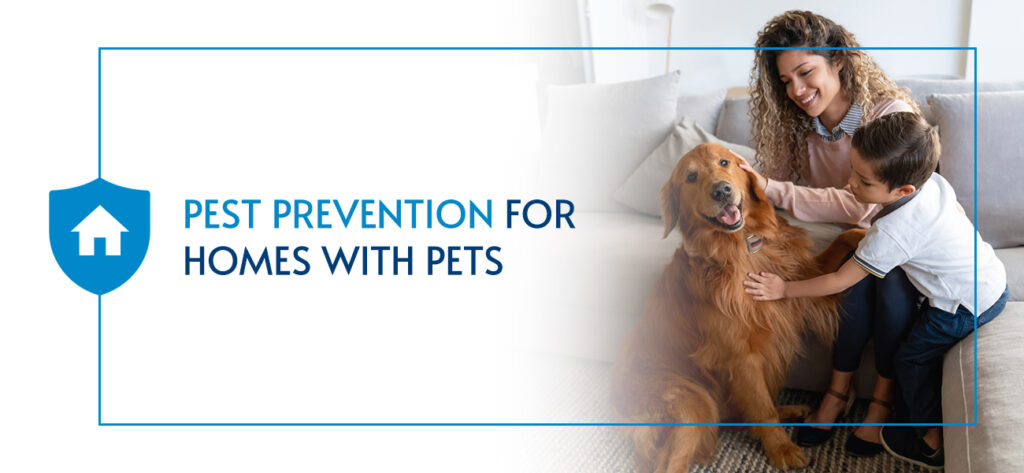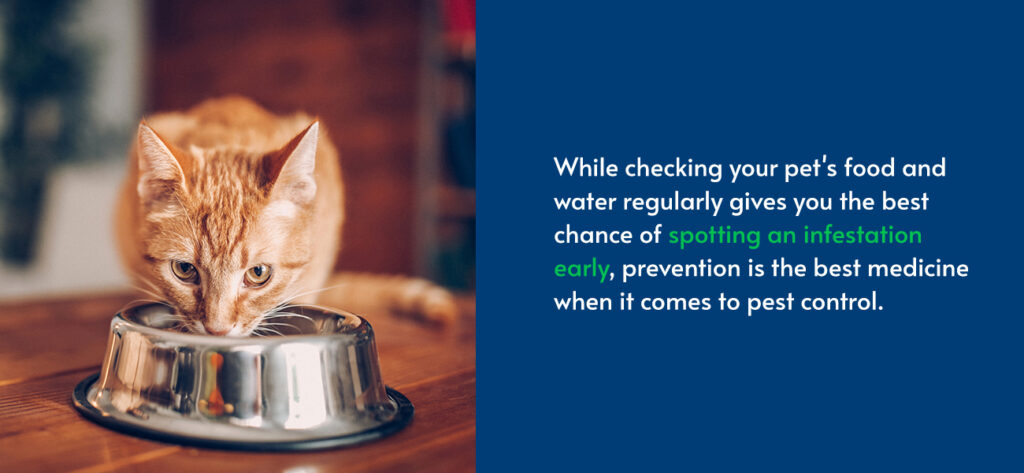Pest Prevention for Homes With Pets

Keeping your pet safe can be a complex operation. While you’ve opened your heart and home to them and made them a part of your family, there are other creatures that you’d much rather stay away.
This article will help you identify which pests are dangerous and which are simply nuisances, as well as how to prevent or eliminate them while protecting your pet’s health.
Are Pest Control Services Safe for Pets?
One of the biggest questions for pet owners facing a pest problem is whether or not the treatment will be safe for their pets. While pets often find it stressful to leave their familiar surroundings, their health and safety is always your primary concern. Luckily, whether you’re applying pesticides yourself or calling a professional, pest control is completely safe as long as you take a few minor precautions.
Read the Label
Pesticide safety labels include all the information you need to know. Check the label for any product you use to learn how to apply and store it safely, first aid instructions and emergency contact numbers. Always keep products in their original packaging, so their labels are easily accessible.
Choose Your Location
If you’re using bait traps instead of sprays, ensure you locate them somewhere your pets can’t access. Bait traps often include ingredients to make them more appetizing to pests, which could also make them appetizing to your pets.
Do Your Research
If you have questions about a particular chemical or product, contact a professional. Your veterinarian or a pest control specialist might have more information about treatment safety.
5 Steps to Take During Pest Control
if a professional pest control service is coming to treat your home — either in response to an infestation or for preventative maintenance — there are a few easy ways to help ensure your pets’ safety:
- Secure your pets during treatment: Keep any pets present during the pest control treatment in another area of the house.
- Clear the area: The safest way to keep your animals from accidentally ingesting potentially harmful chemicals is to remove anything they have regular direct contact with. Relocate their food and water dishes along with any toys, bedding and grooming supplies.
- Protect any contained pets: Remove or securely cover any tanks, terrariums, aquariums or reptile cages before your technician arrives. If they plan to use a fogger, temporarily turn off any fish tank pumps.
- Keep pets away from treated areas: While insecticides dissipate quickly in the air, it’s best to ensure that any treated rooms have proper ventilation. Treated surfaces will take time to dry, and touching a wet surface will likely lead to your pet ingesting some of the chemicals. Keep your pets away from treated areas until the surfaces are completely dry.
- Talk to your pest control technician: Let your technician know about any pets in the house before your appointment. Advance notice will allow them to make any necessary adjustments and give you a chance to ask any questions you have about the treatment.
Pests That Harm Your Pets
You go to great lengths to keep your pets safe. However, some common pests in your home or yard can be carrying hidden dangers. Those pests include:
- Mosquitoes: Along with being an overall nuisance, mosquitoes can transmit diseases and parasites, including heartworm larvae. While dogs and cats are equally likely to develop heartworms from mosquito bites, dogs are especially likely to spread the infection to other animals.
- Ticks: Ticks and the diseases they carry pose a danger to both cats and dogs. Lyme disease frequently causes arthritis in dogs and may also cause fever, dehydration and decreased appetite. While cats are naturally resistant to Lyme disease, other infections from a tick bite can cause anemia, fever, respiratory distress and more.
- Fleas: Like mosquitoes, fleas feed on the blood of their host and leave itchy bites behind. Flea bites cause the skin to become red and irritated and may result in dermatitis, fur loss and sometimes anemia. Additionally, animals can give themselves significant wounds as they scratch or bite at themselves to relieve the itching.
- Rodents: Pests like mice or rats can harm pets through parasites and contaminants they either contain or carry. Diseases like salmonellosis and leptospirosis can spread when your pet eats an infected animal or drinks contaminated water. Rodents may also carry ticks, as well as fleas that can spread infections like cat scratch disease, plague or tapeworm.
How to Prevent Pests

While checking your pet’s food and water regularly gives you the best chance of spotting an infestation early, prevention is the best medicine when it comes to pest control. You may already be working to prevent potential pests if you:
- Keep your pets’ habitats clean: Many pests feed on refuse and are most likely to turn up in search of food or water. Clean your fish tanks, terrariums, bird and pet cages regularly, and watch their dishes for signs of unwelcome intruders.
- Stay on top of maintenance issues: Leaky plumbing can lead to standing water that attracts pests, and creatures looking to escape into your home will squeeze into any available crack or crevice. Staying on top of essential home maintenance can help keep them out.
- Sanitize after spotting pests: While an insect or two is a far cry from an infestation, it’s still best to take preventative measures. If you spot any insect activity, wash and dry any toys and bedding according to the manufacturer’s instructions.
Some pests that are especially common or dangerous to pets may call for specialized strategies. If you’re planning more aggressive preventative measures or think your pet may need treatment for pests that you’ve found on or around them, be sure to consult your veterinarian first.
Cockroaches
Since cockroaches feed on excrement, homes with dogs can be particularly vulnerable. A backyard full of dog poop can attract roaches, which may then quickly find their way inside. To prevent cockroaches in your home:
- Keep food stored in sealed containers.
- Remove open water sources.
- Clean your home thoroughly.
- Eliminate potential hiding places.
Mosquitoes
Preventing mosquitoes in and around your home is good for you, your family and your animals. Maintaining your yard is the best way to control these pests:
- Remove any areas of standing water where mosquitoes may breed.
- Remove excess vegetation.
- Use insecticides.
Rodents
In addition to the dangers they pose to your pets, rodents like mice and rats can also cause serious property damage. You can help keep your home rodent-free if you:
- Keep your exterior walls clear of trees and bushes.
- Use garbage cans with tight-fitting lids.
- Store food in metal, glass or plastic containers.
- Avoid leaving food and water out overnight.
Fleas and Ticks
Fleas and ticks are the pests most likely to find their way into the house on your pets themselves. You can help protect them by using preventative medications with proper precautions:
- Consult your veterinarian about appropriate treatment and application.
- Carefully read the label and follow its directions exactly.
- Be sure to use medications designed for your pet’s species and size.
Since these pests may also find their way inside on their own, you may also want to take further preventative steps:
- Keep your grass short, leaves raked and bushes trimmed.
- Vacuum every day — regular vacuuming can remove adults, larvae and eggs.
- Steam clean your carpets to kill off fleas.
- Wash all pet and family bedding every two to three weeks in hot, soapy water.
Pet-Safe Pest Control Products
If you want something less aggressive than chemical insecticides and stronger than soap and water, you can try these pet-friendly pest control methods:
- Diatomaceous earth: Food-grade diatomaceous earth is a safe way to control fleas and roaches. You can sprinkle it around infested areas or even dust it into your pet’s fur.
- Limonene: Like other citrus oil extracts, limonene is pet- and pollinator-friendly. Limonene acts as a contact insecticide against fleas, roaches, silverfish and more.
Call Pestech for Your Pest Control Needs
Your pets rely on you to keep them safe. At Pestech, we understand that responsibility. We’re GreenPro certified by the National Pest Management Association, and we’re dedicated to bringing you quality pest control with environmentally-conscious materials. Our sprays and baiting programs offer low health risks, volatility and odors.
With regular maintenance visits through our Healthy Home Program, you can prevent the stress and upheaval of a pest infestation. Contact us today to learn more!

